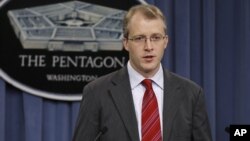The U.S. military says it is withdrawing negotiators from Pakistan after failing to secure an agreement from the Pakistanis to open supply routes to NATO forces in Afghanistan.
The team had been in Pakistan for about six weeks, trying to negotiate a deal with the Pakistanis to reopen border checkpoints for supply convoys. Pakistan closed off the routes in November after a U.S. air raid mistakenly killed 24 Pakistani soldiers near the Afghan border.
The United States offered condolences for the deaths, but not the apology that Pakistan demanded.
Pentagon spokesman George Little says in the absence of an agreement to reopen the routes, the negotiators have been called home.
"Some of the team has left Pakistan," he said. "We expect the other members of the team to leave soon unless circumstances change. That is not to be taken as a sign of our unwillingness to continue the dialogue with the Pakistanis on this issue."
The decision to bring the negotiators back comes after the Pakistani government refused to let a senior U.S. defense official, Peter Lavoy, meet with Pakistan Army Chief of Staff General Ashfaq Kayani in the past few days.
Deteriorating relations
Relations between Islamabad and Washington have been deteriorating rapidly, with the United States expressing frustration about what it says is Pakistan’s failure to do more to stop members of the militant Haqqani Network from using Pakistan to launch attacks on NATO forces in Afghanistan.
On a visit to Afghanistan last week, U.S. Defense Secretary Leon Panetta had harsh words for Pakistan, saying the United States is reaching the limits of its patience with Islamabad for allowing a safe haven for terrorists.
With the routes through Pakistan closed, U.S. forces have had to find other more expensive ways to get supplies into Afghanistan, and costs are adding up. But officials say the closure has not hampered their operations.
U.S. Army Lieutenant General Curtis Scaparrotti, a commander with the International Security Assistance Force, spoke to reporters at the Pentagon via videolink from Afghanistan.
“We have continued to do our job," he said. "It has not really affected us and I do not expect it to be a problem here in the future. We have several other means and they are providing sufficient re-supply for our forces.”
Pentagon officials say the supply route issue remains open. They said that while it is not resolved, the talking has not stalled and they hope to send negotiators back to Pakistan as soon as there is an indication of progress.
The team had been in Pakistan for about six weeks, trying to negotiate a deal with the Pakistanis to reopen border checkpoints for supply convoys. Pakistan closed off the routes in November after a U.S. air raid mistakenly killed 24 Pakistani soldiers near the Afghan border.
The United States offered condolences for the deaths, but not the apology that Pakistan demanded.
Pentagon spokesman George Little says in the absence of an agreement to reopen the routes, the negotiators have been called home.
"Some of the team has left Pakistan," he said. "We expect the other members of the team to leave soon unless circumstances change. That is not to be taken as a sign of our unwillingness to continue the dialogue with the Pakistanis on this issue."
The decision to bring the negotiators back comes after the Pakistani government refused to let a senior U.S. defense official, Peter Lavoy, meet with Pakistan Army Chief of Staff General Ashfaq Kayani in the past few days.
Deteriorating relations
Relations between Islamabad and Washington have been deteriorating rapidly, with the United States expressing frustration about what it says is Pakistan’s failure to do more to stop members of the militant Haqqani Network from using Pakistan to launch attacks on NATO forces in Afghanistan.
On a visit to Afghanistan last week, U.S. Defense Secretary Leon Panetta had harsh words for Pakistan, saying the United States is reaching the limits of its patience with Islamabad for allowing a safe haven for terrorists.
With the routes through Pakistan closed, U.S. forces have had to find other more expensive ways to get supplies into Afghanistan, and costs are adding up. But officials say the closure has not hampered their operations.
U.S. Army Lieutenant General Curtis Scaparrotti, a commander with the International Security Assistance Force, spoke to reporters at the Pentagon via videolink from Afghanistan.
“We have continued to do our job," he said. "It has not really affected us and I do not expect it to be a problem here in the future. We have several other means and they are providing sufficient re-supply for our forces.”
Pentagon officials say the supply route issue remains open. They said that while it is not resolved, the talking has not stalled and they hope to send negotiators back to Pakistan as soon as there is an indication of progress.





